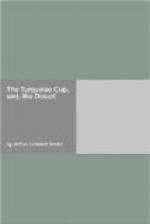“If we carry these two women,” said Abdullah, “we must leave the cargo of two beasts behind. Leave four bales of hides; I took them conditioned upon no better freight offering; and put the women on the two lame camels. In this way we profit most, since we sacrifice least merchandise. The porters will be here at sunrise to help you load. See that they are careful. You remember what happened last time, when our cargoes kept shifting. All seems well to-night, except you have loaded that red camel yonder too high on the right side. How can a camel rest if, when he kneels, his load does not touch the ground? He must support the weight himself.”
“I intended to alter that in the morning,” said Ali.
“The morning may never dawn,” said Abdullah, “and meanwhile you rob the beast of one night’s rest. Attend to it at once. The speed of a caravan is the speed of its slowest camel.”
“Who should know that better than I?” exclaimed Ali. “Have I not crossed the desert nine times with you? Oh, master, bear with me, I am growing old.”
“What is your age?” asked Abdullah.
“One-and-thirty,” replied Ali.
“My friend,” said Abdullah, “you are good for another voyage; and know this, when you fail me, I quit the desert, and turn householder, with a wife or two, and children, if Allah wills it. I myself am six-and-twenty. I have earned a rest. Slama.” And he turned on his heel to go, but he turned again.
“Ali,” he said, “who lives in the first house beyond the mosque, on the left—the house with the green lattices?”
“I do not know, my master,” replied Ali, “but I shall tell you in the morning.”
“Good,” said Abdullah; “and there is a damsel who sits behind the lattice, and always wears a flower in her hair, a red flower, a flower like this,” and he put his hand into the folds of his burnoose and brought out a faded, crumpled, red oleander. “Who is she?”
“Tomorrow,” said Ali.
“Good,” said Abdullah, and he went away.
“Slama” said Ali, and then he added, to himself, “There goes a masterful man, and a just one, but love has caught him.”
And he hurriedly eased the red camel of her load.
II
The next morning the departing caravan had many visitors. The merchants from the arcades came to see that their ventures were properly loaded. They passed comments upon the camels as Englishmen and Americans do upon horses in the paddock or the show-ring. Some they criticised, some they praised, but they were of one mind as to their condition.
“Their humps are fat,” they all agreed; and, as a camel draws upon his hump for food as he draws upon the sacs surrounding his stomach for water, the condition of the caravan was declared to be mleh, which is the Arabic equivalent for “fit.”
Abdullah was a busy man. He signed manifests, received money, receipted for it, felt of surcingles, tightened them, swore at the boys who were teasing the camels, kicked Ali whenever he came within reach, and in every way played the role of the business man of the desert.




